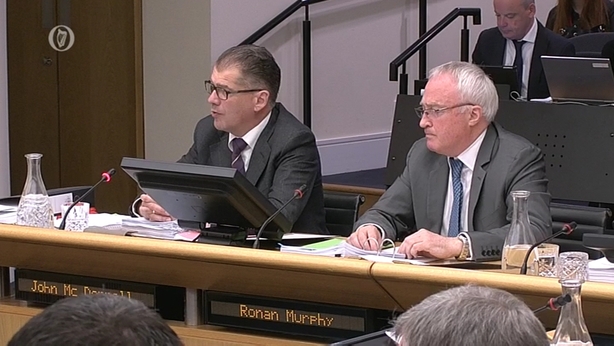Auditors for EBS have told the Oireachtas banking inquiry that the turning point for the building society was a 2005 decision to follow its competition into development and property lending.
The auditors Ernst & Young said this was later described by the bank as a mistake.
Audit partner Dargan FitzGerald said they were not consulted on this decision and had no role. He said they provided high quality audits.
Managing Partner Paul Smith said they performed to the standards at the time. He said he understood the distress and anger caused.
Ernst & Young also audited Anglo Irish Bank but this is not being examined by the committee at this stage because of ongoing criminal proceedings.
Earlier, Bank of Ireland's auditors told the banking inquiry that accounting rules only recognise past transactions and not future events or risks.

PricewaterhouseCoopers said changes have been made since the crisis, which it supported.
PwC was paid €66m for its work for Bank of Ireland.
The firm also said audits in the period from the start of the financial crisis were clearly challenging due to the inherent uncertainty facing the Irish and global economies, and the particular issues faced by Irish banks.
Ronan Murphy, senior partner, said the loan loss provisions were clearly a material estimate in the overall set of financial statements.
The bank's auditors told the inquiry it was not their role to give an opinion on the institution's business model and they denied they were complacent.
Senator Sean Barrett asked if they were complacent given that they gave the bank a clean bill of health.
John McDonnell of PwC said their role was misunderstood, and was limited only to giving an opinion on the financial statements as they reflected the past.
Mr McDonnell said his firm was one of four which met the Financial Regulator in early 2008 to discuss liquidity concerns.
There was questioning of the bank's audit as a going concern in March 2008, its financial year end, as a result of the freezing of securitisation markets and the effect on liquidity.
At the end of the following financial year, March 2009, he said they were very heavily focused on the audit of going concern but the bank had been recapitalised at that point and the guarantee was in place.
The chairman of the inquiry, Labour TD Ciarán Lynch, asked if Bank of Ireland was in crisis five months before the guarantee.
Mr McDonnell said they were in open dialogue in March 2008 on the impact on liquidity due to the sub prime squeeze as funding was becoming more short term and more expensive.
Labour Senator Susan O'Keeffe asked whether they had been out banging the drum for changes to accounting rules prior to 2008.
Mr McDonnell said the rules were appropriate to the time and the substance was still in place.
He said they always called for debate on standards.
PwC said they did some work just before the guarantee on the liquidity position of three institutions.
This work concluded the Friday/Saturday before the guarantee, and was known as Project Atlas.
Mr Lynch intervened and said they would not be talking about Project Atlas at this time, but would return to it at a later stage.
Some of the detail of the report published recently showed the scale of bank losses was greatly underestimated by PwC, which was commissioned by the Financial Regulator.
Fine Gael's Kieran O'Donnell said they did not criticise the accounts in any way when signing off on the 2007 accounts on 20 May 2008.
This was followed shortly afterwards by the bank guarantee and a few months later with €3.5 billion of State money.
He asked how it was possible that PwC could sign off on the statements as a true and fair picture.
Mr McDonnell said they were true and fair and they represented a point in time.
Mr O'Donnell asked how there was no mention of liquidity and solvency given the concerns ongoing.
Mr McDonnell said they did their job very robustly and they stood over them.
He said there was no avenue in the accounts to allow them to give a subjective view.

